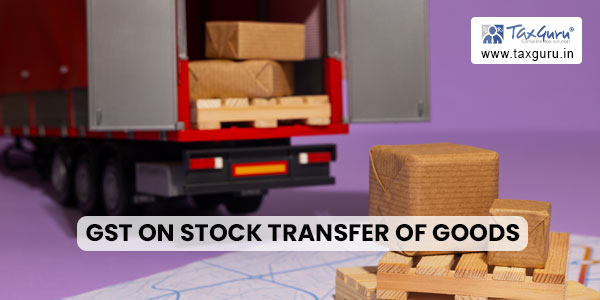Introduction: The taxability of stock transfers of goods is a crucial aspect under the GST regime. Stock transfers, which have been prevalent in both pre- and post-VAT regimes, continue to be a common practice in the GST era. Businesses often consider options such as supplying goods to another dealer or establishing branches in different states, enabling them to transfer goods and serve customers from those locations.
Stock transfers to a branch or consignee agent have been the norm of trade in both the pre- and post-VAT regimes and will continue to exist in the GST regime. Furthermore, stock transfers can be both inter-state and intra-state. Many businesses consider options such as supplying goods to another dealer or opening a branch in another state, sending goods on stock transfer, and then selling them to customers from that branch.
According to Schedule I of the CGST Act, the supply of goods or services between related or distinct persons, even without consideration, is subject to GST when made in the course or furtherance of business. Therefore, Schedule I covers stock transfer transactions made without consideration. The movement of goods or services from one state to another, even if it is to the supplier’s own branch or agent, is considered a supply and is subject to IGST. The branch or consignment agent can claim the credit of IGST paid on such transfer and use it to offset their outward tax liability, resulting in an overall reduction of cost.

However, the taxation of stock transfers effectively acts as a pre-payment of tax on output, primarily impacting the working capital requirements. The impact will vary depending on factors such as stock turnaround time, credit cycle to customers, and the quantity of stock transferred. Therefore, the working capital requirements of a supplier of goods or services will increase in the GST regime. Another reason for the increase in working capital requirement is the abolition of C, E, and H forms. Under the GST regime, suppliers who previously made purchases against these forms will have to pay tax at the applicable rate on all inward supplies. While credit for this tax will be available against their outward tax liability, funds will be blocked in the form of tax payments until they are adjusted against output tax liability. In other words, suppliers of goods will have to make full payment of GST to their vendors for inward supplies, as the benefits of concessional Central Statutory Forms are not available in the GST regime.
Furthermore, suppliers can only utilize this credit when their output tax liability arises in the future. This means that the amount of input tax needs to be invested until the credit can be utilized, which becomes an additional burden on the working capital of the supplier of goods.
Conclusion: Understanding the taxability of stock transfers of goods under the GST regime is essential for businesses engaged in such transactions. It is crucial to grasp the guidelines and implications related to GST on stock transfers, including the applicability of GST on inter-state and intra-state transfers, the impact on working capital requirements, and the abolition of concessional forms. By staying informed about these aspects, businesses can navigate the GST landscape effectively and ensure compliance with the regulations governing stock transfers.
*****
Disclaimer: The content of this document is prepared based on relevant provisions and information available at the time of preparation. While efforts have been made to ensure accuracy, completeness, and reliability, no responsibility is assumed for any errors or omissions. Users are advised to refer to applicable laws and regulations for precise and up-to-date information. The content provided is not professional advice and is subject to change without notice. The use of this information is at the user’s own risk, and I disclaim any liability for any direct, indirect, special, or incidental damages resulting from its use.






Under composite contracts of AMC, if the stocks are transferred inter-state to engineers for AMC services, is GST applicable? If not, in whose name delivery challan can be drawn and what is to be written on Delivery Challan?